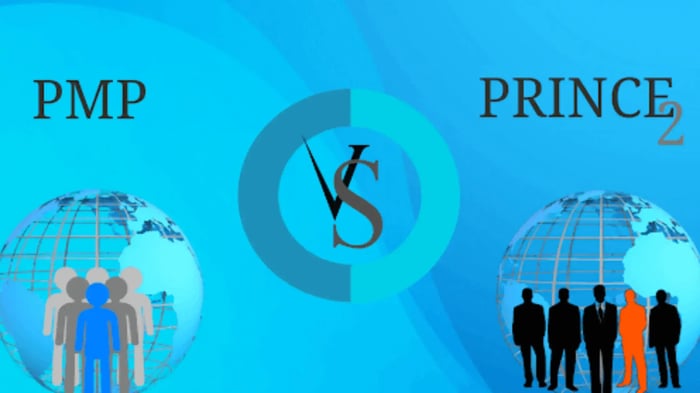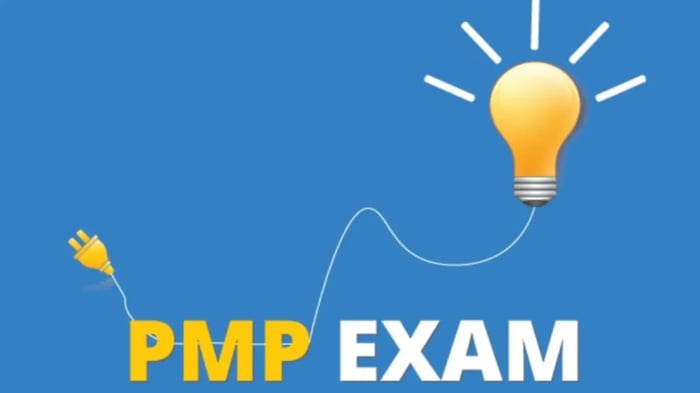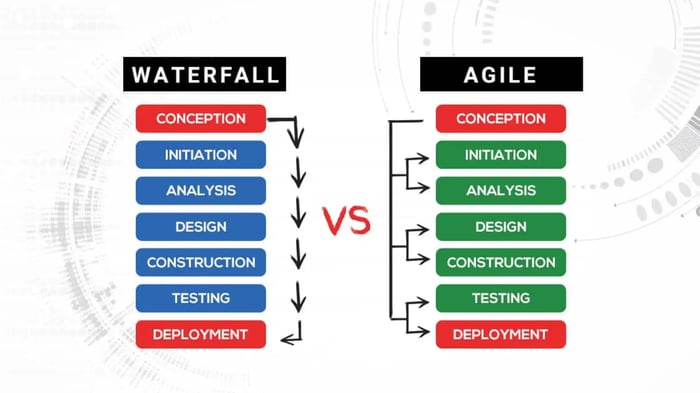Table of Contents
- What is the Certified Scrum Master Certification?
- Why Become a Certified Scrum Master?
- How to Get Your Certified Scrum Master Certification?
- Certified Scrum Master Certification Cost
- Top Scrum Master Training Providers
- The Benefits of Being a Certified Scrum Master
- What You Can Do With a Certified Scrum Master Certification?
- Common Challenges for Scrum Masters
- 10 Key Facts You Didn't Know About Scrum Master Certification
- FAQs
Welcome to the ultimate guide to becoming a Certified Scrum Master (CSM)! 🎉 You’ve probably heard about Scrum and its importance in project management, and now you’re considering taking the plunge into becoming a CSM. But wait—what is a Certified Scrum Master certification, and why should you care? Well, sit tight because we’re about to dive deep into everything you need to know, from certification costs to the unique advantages that will make you the go-to project manager in any organization.
And don't worry—no fluff here. This blog will be packed with insider tips, pro strategies, and expert advice to help you navigate the path to Scrum mastery. 🚀

What is the Certified Scrum Master Certification?
In the simplest terms, the Certified Scrum Master (CSM) certification is your official ticket to mastering the Scrum framework for managing agile projects. Scrum is one of the most widely used methodologies in project management, and Scrum Masters are the champions who guide teams to successfully implement and run Scrum.
A CSM is an agile professional trained to understand Scrum principles, lead teams, remove obstacles, and ensure that the Scrum process flows smoothly. Whether you're managing software development, product design, or even large-scale business transformations, being a Scrum Master makes you an invaluable asset to your team.
For more detailed insights into project management certification, check out our Project Management Resource Center.
Why Become a Certified Scrum Master?
So, why should you care about becoming a Certified Scrum Master? Here are a few compelling reasons:
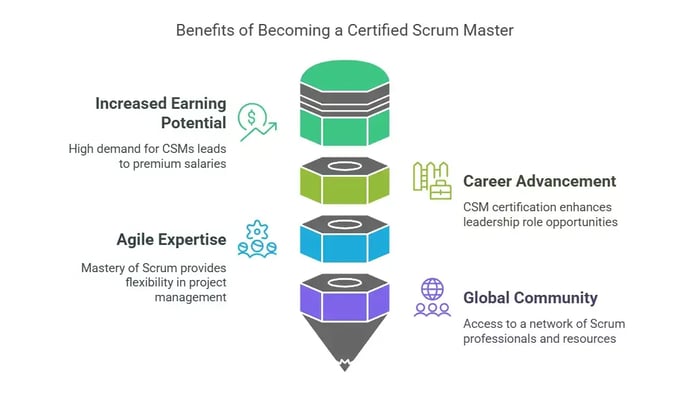
Increase your Earning Potential: CSMs are highly sought after, and demand is growing in virtually every industry. Companies are ready to pay a premium for skilled Scrum Masters who can drive efficiency and success.
Boost Your Career: A CSM certification signals to employers that you have the expertise to manage complex projects using the Scrum framework. It's a great step forward if you're aiming for leadership roles.
Gain Agile Expertise: Scrum is a key part of the agile world, and knowing it inside out is an asset to any project manager. It gives you the flexibility to handle fast-moving projects with ease.
Join a Global Community: As a Scrum Master, you'll have access to an extensive global network of Scrum professionals and resources that can help you grow.
Learn more about the benefits of project management certification and how it can impact your career by visiting The Top Benefits of Project Management Certification.
How to Get Your Certified Scrum Master Certification?
Becoming a Certified Scrum Master is easier than you might think. Here's a step-by-step breakdown:
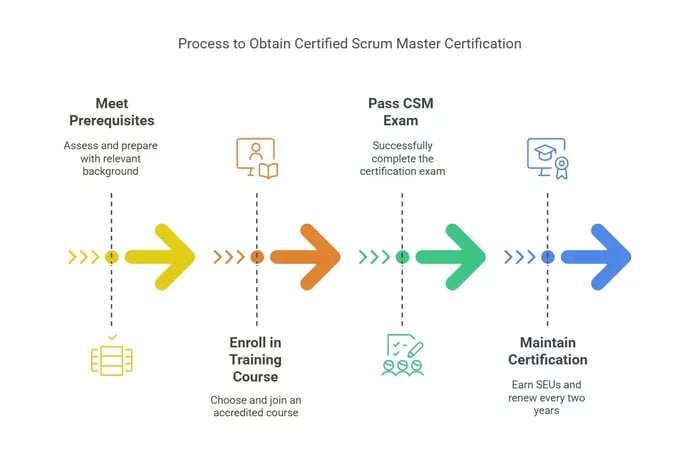
Step 1: Meet the Prerequisites
There are no strict prerequisites to becoming a CSM, but having some background in project management or team leadership can help.
Step 2: Enroll in a Scrum Master Training Course
To get your certification, you must complete an accredited Scrum Master course. Many organizations offer these courses online, in-person, or through a combination of both. You’ll need to choose a course that suits your learning style.
Step 3: Pass the CSM Exam
After completing the training, you’ll need to take and pass the CSM exam, which tests your knowledge of Scrum principles and practices.
Step 4: Maintain Your Certification
To keep your certification active, you'll need to earn Scrum Education Units (SEUs) and renew your certification every two years.
Preparing for the project management certification test? Dive into our comprehensive guide, Mastering the Project Management Certification Test.
Certified Scrum Master Certification Cost
Now, let’s talk about the Certified Scrum Master Certification cost. 🏷️ The cost of obtaining your CSM can vary depending on the training provider and the format of the course. Here's a breakdown:
Training Courses: Most Scrum Master training programs range from $800 to $2,000, depending on the provider, the course format, and the location.
Exam Fees: After completing the course, you'll need to pay an exam fee, which typically ranges from $100 to $150.
Renewal Fees: The cost to renew your CSM certification is usually around $100 every two years.
In comparison to other certifications, such as PMP or PMI-ACP, the cost of becoming a Scrum Master is relatively affordable. Plus, the value you get in terms of career growth and salary bump is definitely worth the investment.
Top Scrum Master Training Providers
When it comes to choosing where to get your training, you want to make sure you go with a reputable provider. Here are some of the top names in Scrum Master certification:
Provider | Cost | Course Format | Duration |
Scrum Alliance | $1,000 - $2,000 | In-person, Online | 2 Days |
APMIC | $850 | Online & Hybrid | 2 Days |
Coursera | $500 - $900 | Online (Flexible) | Self-paced |
Udemy | $150 - $300 | Online | Self-paced |
Each provider offers unique benefits, so choosing one depends on your learning style and schedule. The key is to choose a course that aligns with your professional goals and needs. You can enhance your Scrum Master skills with the Scrum Master Toolkit provided by Rebel Scrum, which offers practical templates and guides to get you started.
Certified Scrum Master vs. Other Project Management Certifications
When you're considering certification options, it's important to compare the Certified Scrum Master with other project management certifications. For example:
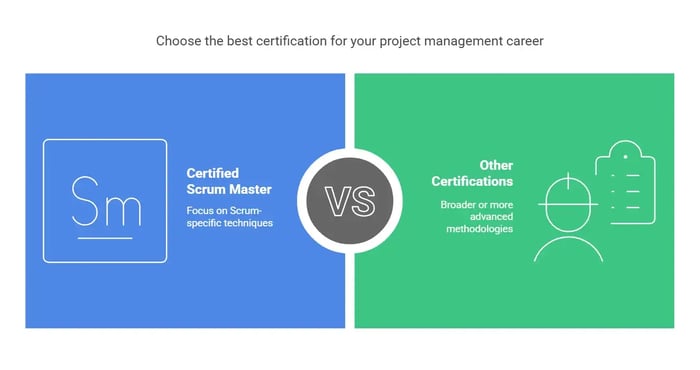
Certified Scrum Master vs PMP: PMP is broader and more suited for traditional project management, while CSM focuses on Agile and Scrum-specific techniques.
Certified Scrum Master vs PMI-ACP: PMI-ACP is a more advanced certification and covers multiple agile methodologies, whereas CSM is Scrum-specific.
Certified Scrum Master vs Agile Certified Practitioner: The CSM is a foundational certification, while ACP covers more complex agile project management scenarios.
By comparing these certifications, you can see that a Certified Scrum Master provides a more targeted approach for agile teams, while others may be more generalized.
The Benefits of Being a Certified Scrum Master
Pro Tip: 🏆 CSMs don’t just help teams—they transform them!
As a Certified Scrum Master, you’ll enjoy numerous benefits, such as:
Increased Marketability: The CSM certification shows employers that you are serious about your career.
Leadership Growth: It helps you grow as a leader who can motivate teams to perform at their best.
Agile Expertise: You’ll gain the agility to navigate fast-moving projects and changes with ease.
What You Can Do With a Certified Scrum Master Certification?
Once you’re certified, you can work in industries like:
Software Development
IT
Marketing
Healthcare
Finance
Construction
Whether you want to manage small teams or lead large projects, the possibilities are endless.
Common Challenges for Scrum Masters
Let’s be real: even the best Scrum Masters face challenges. Here are some common hurdles:
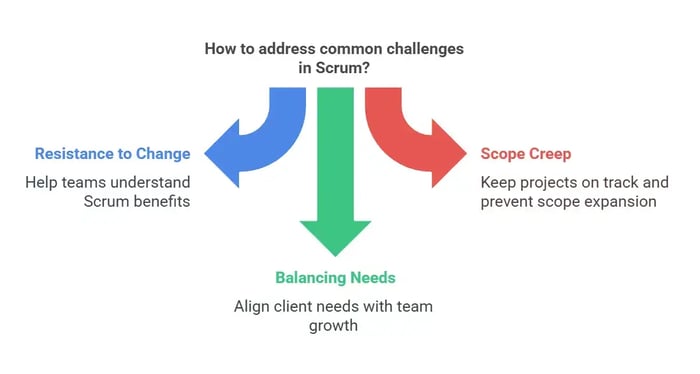
Resistance to Change: Some teams may resist adopting Scrum. It’s your job to help them understand the benefits.
Scope Creep: Scrum projects can sometimes face scope creep. Scrum Masters need to keep the project on track and prevent it from happening.
Balancing Team Needs: You need to strike a balance between meeting client needs and supporting your team’s growth.
10 Key Facts You Didn't Know About Scrum Master Certification
Here are 10 less commonly known facts about the Certified Scrum Master certification that might surprise you:
Scrum Masters are also known as agile facilitators. They guide the team and ensure smooth communication. (Scrum Alliance)
The first Scrum certification was created in 2002 by Scrum Alliance. (Scrum.org)
Scrum is based on lean principles, which focus on reducing waste. (Lean.org)
The role of Scrum Master isn’t about managing people—it’s about managing processes. (PMI)
Scrum Masters can help transform organizations, not just teams. (Scrum Alliance)
CSM certifications are valid for two years before renewal.
Being a Scrum Master is not a “full-time” job; it’s more of a support role in agile environments. (Agile Alliance)
A Scrum Master doesn’t just facilitate meetings but is involved in continuous improvement. (Scrum.org)
Some organizations refer to Scrum Masters as agile coaches.
Scrum certification can boost your career in industries beyond IT, like marketing, healthcare, and finance. (Agile Alliance)
Conclusion: Is Certified Scrum Master Certification Worth It?
Absolutely! The Certified Scrum Master certification is an investment in your career that pays off in terms of higher earning potential, more job opportunities, and a deeper understanding of agile project management. Whether you’re new to the field or looking to enhance your skills, this certification will help you stand out.
If you're ready to take your career to the next level, check out APMIC for a top-tier project management certification. At APMIC, we offer the best Scrum Master training that will set you up for success. 🏅
Ready to start your journey? Visit APMIC Project Management Certification and kick-start your Scrum Master career today!
FAQs
What is a Certified Scrum Master?
A Certified Scrum Master (CSM) is an individual trained in Scrum principles and certified to facilitate Scrum processes in teams.
How long does it take to become a Certified Scrum Master?
Typically, it takes 2-3 days to complete the training, followed by passing the exam.
What are the prerequisites for becoming a Scrum Master?
There are no formal prerequisites, though experience in project management can help.
How much does it cost to get a Scrum Master certification?
The cost can range from $800 to $2,000 for training and exam fees.
What are the benefits of being a Scrum Master?
CSMs gain leadership skills, enhanced career prospects, and the ability to manage agile projects effectively.
Can I become a Scrum Master without project management experience?
Yes, the certification is accessible to individuals with minimal project management experience.
Is CSM certification recognized globally?
Yes, CSM is recognized worldwide and valued across multiple industries.
How do I maintain my Scrum Master certification?
You need to earn Scrum Education Units (SEUs) and renew your certification every two years.


